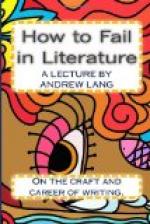The common novels of Governess life, the daughters and granddaughters of Jane Eyre, still run riot among the rejected manuscripts. The lively large family, all very untidy and humorous, all wearing each other’s boots and gloves, and making their dresses out of bedroom curtains and marrying rich men, still rushes down the easy descent to failure. The sceptical curate is at large, and is disbelieving in everything except the virtues of the young woman who “has a history.” Mr. Swinburne hopes that one day the last unbelieving clergyman will disappear in the embrace of the last immaculate Magdalen, as the Princess and the Geni burn each other to nothingness, in the Arabian Nights. On that happy day there will be one less of the roads leading to failure. If the pair can carry with them the self-sacrificing characters who take the blame of all the felonies that they did not do, and the nice girl who is jilted by the poet, and finds that the squire was the person whom she really loved, so much the better. If not only Monte Carlo, but the inevitable scene in the Rooms there can be abolished; if the Riviera, and Italy can be removed from the map of Europe as used by novelists, so much the better. But failure will always be secured, while the huge majority of authors do not aim high, but aim at being a little lower than the last domestic drivel which came out in three volumes, or the last analysis of the inmost self of some introspective young girl which crossed the water from the States.
These are general counsels, and apply to the production of books. But, when you have done your book, you may play a number of silly tricks with your manuscript. I have already advised you to make only one copy, a rough one, as that secures negligence in your work, and also disgusts an editor or reader. It has another advantage, you may lose your copy altogether, and, as you have not another, no failure can be more complete. The best way of losing it, I think and the safest, is to give it to somebody you know who has once met some man or woman of letters.. This somebody must be instructed to ask that busy and perhaps casual and untidy person to read your manuscript, and “place” it, that is, induce some poor publisher or editor to pay for and publish it. Now the man, or woman of letters, will use violent language on receiving your clumsy brown paper parcel of illegible wares, because he or she has no more to do with the matter than the crossing sweeper. The MS. will either be put away so carefully that it can never be found again, or will be left lying about so that the housemaid may use it for her own domestic purposes, like Betty Barnes, the cook of Mr. Warburton, who seems to have burned several plays of Shakespeare.
The MS. in short will go where the old moons go.
And all dead days drift thither,
And all disastrous
things.




